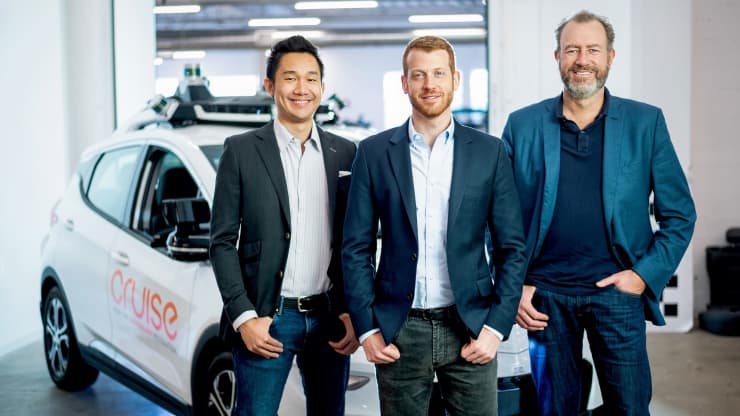
DETROIT – General Motors has been mum about the abrupt departure Thursday of Dan Ammann, the CEO of the company’s majority-owned autonomous vehicle subsidiary Cruise.
GM President Mark Reuss, however, hinted Friday at a possible disagreement on strategy, saying the company and subsidiary now “totally align” under Cruise’s new interim leadership with founder Kyle Vogt.
Reuss declined to comment much beyond a company statement released Thursday afternoon about Ammann leaving Cruise, but his remarks Friday allude to a rift at the top.
“We believe Cruise is in great hands with Kyle Vogt, Cruise’s cofounder, president and CTO [chief technology officer]. He’s taking on the role of interim CEO,” Reuss told CNBC’s Phil LeBeau during an interview on “Squawk on the Street.”
“Cruise and GM, we’re really totally align now on accelerating the joint autonomous vehicle strategy that we outlined at our recent investor day,” Reuss said.
Those growth plans, which were detailed by Ammann in early October, included commercializing a robotaxi as early as next year in San Francisco, followed by ramping up operations to 1 million such vehicles by 2030.
It’s unclear at this time what lead to Ammann’s abrupt departure. It did follow some renewed speculation from Wall Street analysts that Cruise could be more valuable spun off from the automaker.
After speaking with GM, Citi analyst Itay Michaeli told investors in a note Friday that he believes Ammann’s departure was regarding “strategic decisions around Cruise (i.e. IPO timing)” as GM has “increasingly come to view Cruise as integral to its Consumer AV [autonomous vehicle] strategy.”
Shares of GM were down Friday morning by as much as 7% to $54.51 a share. The stock closed Friday at $55.16, off 5.5%.
Ammann, a former investment banker, began leading Cruise in 2019 after serving as GM’s president as well as chief financial officer before that. He is credited with the 2016 acquisition of Cruise.
But Cruise, under Ammann, has missed some key milestones, most notably plans to launch a ride-hailing service for the public in San Francisco in 2019. The company delayed those plans that year to conduct further testing and obtain regulatory approvals.
A GM spokesman declined to elaborate on Reuss’ comments, noting that “GM and Cruise bring massive manufacturing and technological scale to autonomy that will rapidly drive costs down. The integrated strategy will also maximize GM and Cruise’s total addressable market by leveraging synergies, leading to greater, more sustainable value for both GM and Cruise shareholders.”
Since acquiring Cruise, GM has invested billions in its operations and brought on investors such as Honda Motor, Softbank Vision Fund and, more recently, Walmart and Microsoft.